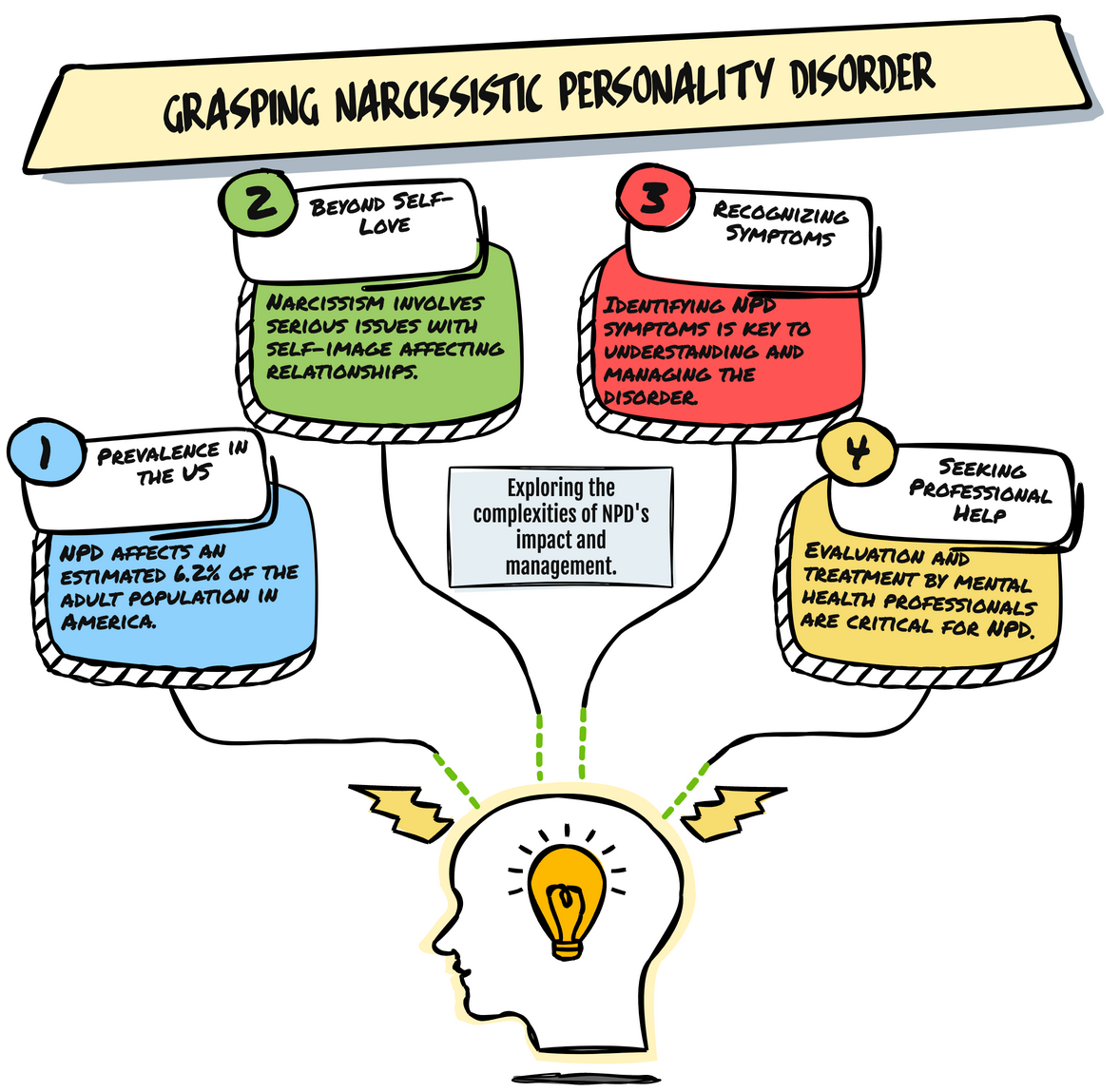When considering Narcissistic Personality Disorder, key traits to note are a grandiose sense of self-importance, constant need for admiration, exaggerated self-image, entitlement, and a lack of empathy. Recognize narcissistic behavior through manipulation, gaslighting, projection, and idealization. In relationships, expect a lack of empathy, exploitation, entitlement, emotional distress, and conflicts. Understanding narcissistic entitlement involves seeking special treatment, feeling superior, demanding admiration, exploiting relationships, and disregarding others' well-being. Coping includes setting clear boundaries, prioritizing self-care, avoiding conflicts, seeking professional help, and focusing on personal well-being. Explore more insights to grasp the complexity of NPD traits.
Key Takeaways
- Grandiose sense of self-importance and superiority.
- Constant need for admiration and validation.
- Lack of empathy and disregard for others' feelings.
- Sense of entitlement to special treatment.
- Tendency to manipulate, exploit, and lack reciprocity in relationships.
Common Traits of Narcissistic Personality Disorder
When examining common traits of Narcissistic Personality Disorder, one immediately notices a grandiose sense of self-importance in individuals affected by this condition. People with Narcissistic Personality Disorder (NPD) often exhibit a need for constant praise and admiration from others. This exaggerated sense of self leads to a pervasive feeling of entitlement, where individuals believe they deserve special treatment or privileges.
Alongside this entitlement comes a notable lack of empathy towards others, as those with NPD struggle to understand or relate to the feelings and experiences of those around them. Exploitative behavior, where individuals take advantage of others without remorse, is another hallmark trait of Narcissistic Personality Disorder.
This combination of traits creates a complex personality profile that can be challenging to navigate in personal and professional relationships. Understanding these key characteristics is vital in recognizing and addressing the behaviors associated with NPD.
Recognizing Narcissistic Behavior Patterns

Narcissistic behavior patterns, such as manipulation, gaslighting, projection, idealization and devaluation, and hoovering, are key indicators to watch for in individuals with Narcissistic Personality Disorder. These patterns are tools used by those with NPD to exert control and power over others.
Manipulation, a common trait, involves influencing someone into acting in a way that benefits the narcissist. Gaslighting, another insidious behavior, aims to make the victim question their own reality or sanity, ultimately granting the narcissist dominance.
Projection occurs when the narcissist attributes their own undesirable traits onto others, deflecting criticism away from themselves. Idealization and devaluation form a toxic cycle where the narcissist first puts their target on a pedestal, only to later tear them down.
Hoovering is a manipulative tactic utilized to draw the target back into a relationship after discarding them. Understanding these narcissistic behavior patterns is vital for recognizing and protecting oneself from their harmful effects.
Impact of NPD on Relationships

In relationships with individuals affected by Narcissistic Personality Disorder (NPD), the lack of empathy often poses significant challenges. People with NPD may engage in exploitative behaviors, prioritizing their own needs above their partners'. This can create a sense of entitlement and lead to a lack of reciprocity in emotional support.
Establishing clear boundaries becomes pivotal to safeguard emotional well-being and prevent manipulation in such relationships. The impact of NPD on relationships can result in emotional distress, conflicts, and difficulties in maintaining healthy communication and trust. Understanding these dynamics early on is crucial to navigate the complexities that arise.
Understanding Narcissistic Entitlement

Understanding narcissistic entitlement reveals the self-centered beliefs and behaviors characteristic of Narcissistic Personality Disorder (NPD). Individuals with narcissistic entitlement believe they deserve special treatment and privileges, often feeling superior and entitled to admiration, attention, or resources.
This sense of entitlement can lead to demanding behaviors where they seek excessive attention and validation from others, disregarding the feelings and needs of those around them. People with narcissistic entitlement may exploit relationships or situations for personal gain, showing a lack of empathy for others' well-being.
Recognizing narcissistic entitlement is crucial in understanding the self-centered nature of NPD and the impact it can have on relationships. By acknowledging these demanding and exploitative behaviors, one can begin to navigate interactions with individuals exhibiting narcissistic entitlement more effectively.
It's essential to establish boundaries and seek support when dealing with individuals who display such characteristics to protect one's well-being and emotional health.
Coping Strategies for Dealing With NPD

When dealing with individuals who exhibit traits of Narcissistic Personality Disorder, establishing clear and firm boundaries is vital for maintaining emotional well-being and managing interactions effectively. It's essential to recognize and accept that individuals with narcissistic traits may struggle with empathy and prioritize their own needs above others.
Avoiding power struggles or arguments can help prevent escalating conflicts. Instead, prioritize self-care and emotional well-being by setting boundaries that protect your mental health. Remember that seeking support from a therapist or counselor can provide valuable guidance on handling relationships with individuals with NPD.
Coping strategies for dealing with NPD include staying grounded in reality, avoiding manipulation tactics, and focusing on your own well-being. By setting firm boundaries, practicing self-care, and seeking support when needed, you can effectively manage interactions with individuals exhibiting narcissistic traits while prioritizing your emotional well-being.
Frequently Asked Questions
What Are 5 of the Main Symptoms of Narcissism?
When considering the main symptoms of narcissism, it's important to highlight:
- A grandiose sense of self-importance
- Constant need for admiration
- Lack of empathy
- Sense of entitlement
- Exploitative behavior without guilt or shame
These traits collectively define narcissistic behavior and can have detrimental effects on relationships and interactions with others.
Understanding these key symptoms is essential in recognizing and addressing narcissistic tendencies in oneself or others.
How Do Narcissists Act?
When dealing with narcissists, they often act in ways that seek attention and validation, displaying grandiosity and a constant need for admiration. Their lack of empathy can lead to manipulation of others without remorse, coupled with a sense of entitlement and arrogance.
It's important to set boundaries and not feed into their behaviors to maintain your own well-being and not enable their harmful actions.
Conclusion
In summary, understanding the key traits of Narcissistic Personality Disorder is essential in comprehending and managing individuals who display such behavior patterns.
By recognizing the impact NPD can have on relationships and grasping narcissistic entitlement, we can develop coping strategies to navigate these challenging dynamics.
Remember, knowledge is power when it comes to handling interactions with individuals with NPD. Stay informed, stay aware, and prioritize your own well-being above all else.
Chris brings a wealth of knowledge and personal experience to the role of Expert Author. With a focus on narcissistic personality disorder and recovery processes, Chris’s articles offer a mix of expert analysis, personal anecdotes, and actionable advice. Their work enriches our platform with depth, authenticity, and a perspective that resonates with those who have experienced narcissism firsthand.











